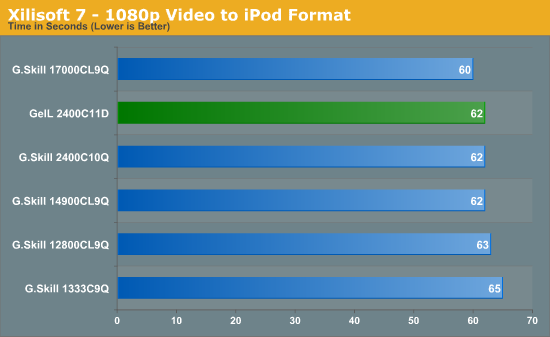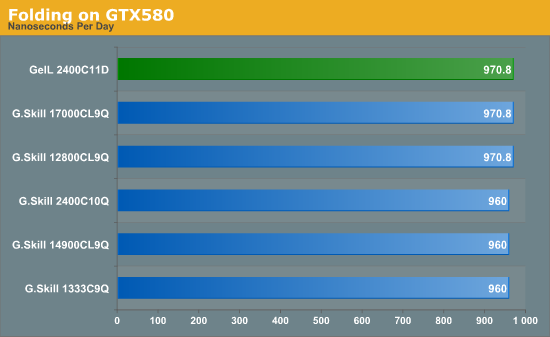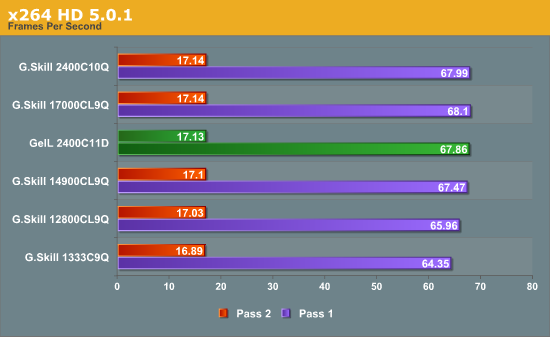GeIL Evo Veloce Review: 2x8GB at DDR3-2400 C11-12-12 1.65 V
by Ian Cutress on October 24, 2012 5:50 PM EST- Posted in
- Memory
- Ivy Bridge
- DDR3
- GeIL
Conversion – Xilisoft 7
Another classic example of memory bandwidth and speed is during video conversion. Data is passed between the memory and the CPU for processing – ideally faster memory here helps as well as memory that can deal with consecutive reads. Multiple threads on the CPU will also provide an additional stress, as each will ask for different data from the system. If we combine this with the capability of using GPUs that Xilisoft Video Converter 7 allows, we can attempt to really tax the memory. Our test consists of converting 26GB of various sized videos (1080p to VGA), totalling 45+ hours of video time, to MP2 format using our test bed.


No surprising results from our Xilisoft testing.
Folding on GPU
Memory usage is all algorithm dependent – if the calculation has a lot of small loops that do not require additional reads memory, then memory is unimportant. If the calculation requires data from other sources in those calculations, then memory can either be stressed randomly or sequentially. Using Ryan’s Folding benchmark as a platform, we are testing how much memory affects the serial calculation part of a standard F@H work unit. Unfortunately this test is to the nearest second, but we convert the time taken into nanoseconds per day for the graph.

As confirmed in our round up, memory speed (or module size, moving from 4GB to 8GB) has no appreciable effect on folding.
WinRAR x64 4.20
When compressing or converting files from one format to another, the file itself is often held in memory then passed through the CPU to be processed, then written back. If the file is larger than the available memory, then there is also loading time between the storage and the memory to consider. WinRAR is a variable multi-threaded benchmark, whereby the files it converts and compresses determines how much multi-threading takes place. When in multithreaded mode, the rate of cache misses can increase, leading to a less-than optimal scaling. Having fast memory can help with this.

The WinRAR test confirms the results obtained from the MemTweakIt software – the 2400 C11 kit performs similar to the 2133 C9, but just a bit behind.
Greysky's x264 HD 5.0.1
The x264 HD test, now version 5.0.1, tests the time to encode a 1080p video file into a high quality x264 video file. This test is standard across a range of reviews from AnandTech and other websites allowing for easy comparison. The benchmark is capable of running all cores to the maximum. Results here are reported as the average across four attempts for both the first and second passes.

While there is not much difference between the high end kits, the 2x8 GB 2400 C11 almost matches the 4x4 GB 2400 C10.










30 Comments
View All Comments
Beenthere - Wednesday, October 24, 2012 - link
Can't change the type from 8166 MHz. to the proper 1866 MHz. but most folks should be able to figure it out...silverblue - Thursday, October 25, 2012 - link
Of course, if you have an APU-based system, the faster memory does indeed make a difference... though I agree, it's the exception rather than the norm.JlHADJOE - Thursday, October 25, 2012 - link
But then its totally contrary to one of the main reasons behind having an APU -- penny pinching.These kits cost twice the DDR3-1333 going rate, so that's $75 you could have put into a GPU. Can't speak for everyone, but I'd probably choose an i3 with DDR3-1333 + a 7750 over an A10-5800k with DDR3-2400.
JohnMD1022 - Wednesday, October 24, 2012 - link
My thoughts exactly.1600 seems to be the sweet spot on price and performance.
PseudoKnight - Wednesday, October 24, 2012 - link
Anandtech did a series of memory frequency tests like a year ago (I forget exactly). While they found that 1333 to 1600 didn't offer much in terms of average FPS gains in gaming, it had a clearer impact on minimum frame rates. I'm not saying it's worth it either way here, but I'd like people to give some attention to minimum frame rates when talking about the benefits of bumps in memory frequency.That said, 2400 is obviously overkill here, but that should be obvious to anyone who wants to spend their money efficiently.
Impulses - Thursday, October 25, 2012 - link
The article the did a year ago (with Sandy Bridge in mind) says absolutely nothing about minimum frame rates vs average... I don't even see how faster memory could have such an effect with a dedicated GPU.Impulses - Thursday, October 25, 2012 - link
*theyJlHADJOE - Thursday, October 25, 2012 - link
It might have been techreport. They're the guys who usually do those frame-time measurements.poohbear - Thursday, October 25, 2012 - link
pseudoking what are u talking about? there is virtually NO effect on minimum frames on a dedicated GPU system. Ever since the memory controller moved to the CPU, the RAM timings have become ALOT a less important component in the system. The only way it shows a difference is when you go to all kinds of outlandish scenerios that involve isolating the GPU and CPU to situations that show some difference between RAM, but in a real world setting those situations are so rare that it becomes pointless to even entertain them.Ratman6161 - Thursday, October 25, 2012 - link
But add running virtual machines to your list of reasons why a lot of memory might be good. When working from home I've actually typically got the host machine where I'm doing most of my actual work plus at least two virtual machines running, each VPN'ed into a different remote network. So it isn't too uncommon for me to see about 90% of my 16 gb in use at any one time. And I do occasionally hit times when I have to shut down one VM in order to start another. So I wouldn't actually mind having 32 GB.On the other hand, while I need a large quantity of RAM, my 1600 MHz G-Skill works just fine performance wise so I don't need speed - I need quantity.